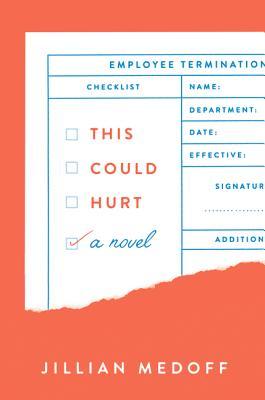As a former magazine employee (though really after what’s now remembered as a last “golden age”), I might find it too heartbreaking to read the Dan Peres memoir about Condé Nast. But as it was published, I’d finished reading This Could Hurt, a workplace novel by Jillian Medoff where the heroes all work in the HR department of a market research firm that’s been upended and hobbled by the Financial Crisis.
It’s a solid office-based book and I’m a big believer in fiction that portrays the working life. Very often, to set an interesting plot in motion, an author will rely on some deus ex machina to reduce or eliminate the pecuniary needs of the protagonists. One way to do this is to just make the main characters wealthy enough that they only have to work by choice, if at all. Or maybe there’s an inheritance, or a benefactor with other motives… it is nice to get our characters out of the office and into a small town in Thailand, when we can. But most readers have to go to work and they deserve our attention, too.
Among the reactions I’ve seen to the Peres memoir are people who are shocked or surprised that people might take drugs and then go to work, or that they might drink alcohol at lunch.

Medoff’s novel, published in 2018 and set in the early part of that decade, gets a lot of its plot from people stretching and breaking the HR rules as they develop overly personal relationships with one another, in and out of the office. I dare say that though the novel is written by a high-level HR pro, that much of the behavior in her book would not be tolerated in a real workplace, were it unearthed by the wrong people.
Now, in the old days, especially in media, drinking was tolerated in the workplace — well, not for everybody, because nothing was ever for everybody. The guy who indulged in the 3 martini lunch wasn’t a lush with a problem who is messing up the health insurance premiums for everybody, he was a guy with an expense account and enough clout and influence that he could be tipsy or lazy in the afternoon. So if you wrote a workplace novel back then and had a character tip back strong cocktails in the middle of a Wednesday afternoon, the reader would immediately get that they’re reading about a man of influence.
My guess is when presented with that same character in 2020, most readers would see a man with poor judgment and impulse control and a potential villain. Maybe a modern Falstaff would be the best possible outcome.
When I used to work at Forbes there were tales of a long-abolished office drink cart. We 20 somethings wondered, “why don’t they bring that back?” But we knew why and knew it wasn’t coming back. Now people don’t even think it would be a fun idea to bring the drink carts back. They see it as evidence of our collective past dysfunctions.
